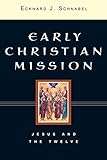How Paul understood his call
I've grown weary of relying too heavily on business literature, the social sciences or even contemporary missional theology for my understanding of church planting movements. It's back to the Book for me.
I've been working through Schnabel's Early Christian Mission: Paul and the Early Church. Detailed but valuable insights into the mission of Jesus, the Twelve, Paul and the early church.
Here's my summary of his reflections on I Corinthians 3 and Paul's understanding of his calling as a pioneer missionary-church planter.
These insights should shape how we understand the calling of a pioneer church planter today.
Background Paul is concerned that the Corinthian Christians have accepted human wisdom as the decisive measure of their spirituality and the criterion for evaluating the effectiveness of Christian preachers and teachers. The result were divisions in the church as groups championed different teachers.
Paul's problems with the Corinthian church provides the backdrop to paint the picture of how he understands his calling as a pioneer missionary-church planter.
What, after all, is Apollos? And what is Paul? Only servants, through whom you came to believe--as the Lord has assigned to each his task. I planted the seed, Apollos watered it, but God made it grow. So neither he who plants nor he who waters is anything, but only God, who makes things grow. The man who plants and the man who waters have one purpose, and each will be rewarded according to his own labor. For we are God's fellow workers; you are God's field, God's building. (1 Cor 3:5-9)
1. Paul understands himself as a servant (v5).
Paul knows himself to be bound to God and to Jesus Christ as a servant, which excludes the possibility that he or anyone else might rule over the church or within the church.
Paul uses images from agriculture and house construction to describe the tasks and activities of missionaries, preachers and teachers: they plant, they water, they build. In contrast, the Greco-Roman elites despised manual labor.
2. God is the Lord of missionary work and of church work (v5).
If Paul and other Christian leaders are “servants†then God is their “masterâ€. It was God who assigned to each missionary and preacher his task and who gave to each one and everyone different gifts.
3. There is only one ministry (v8a).
The pioneer missionary who ˜plants and the teacher in the church who waters are involved in the one and the same task, and both are dependent on the same Lord. They are literally one.
4. Paul as a pioneer missionary plants churches.
Paul sees himself as pioneer missionary called by God to plant (v6) and to lay the foundation (v10) that is, to establish new churches.
Apollos and other preachers water (v6) and build on the foundation (v10); that is they encourage and promote the further growth of the church, teaching the believers and reaching unbelievers.
The Lord has assigned different tasks to each (v5).
The Corinthian Christians focus on the personality of the preacher and teacher ( I Cor 1:10-17; 3:1-4). This attitude contradicts the character and the nature of the Christian message, whose center is the crucified Messiah (I Cor 1:13, 17-18; 2:2).
5. Success always comes from God and God alone (v6-7).
This is true both for pioneer missionaries and for preachers and teachers in local congregations: only God gives growth.
The effectiveness of missionary work and of church ministry does not depend on persons or programs, it does not depend on techniques or methods, but only on God's activity.
Preachers are nothing—a nothing from which only the creative act of God can make something. If God does not grant organic growth, the seed or grain of wheat would be like a lifeless pebble.
6. The church is God's field, God's building (v9b)
The churches that are established as the fruit of missionary work belong to neither Paul nor to other teachers.
The origin and the growth of the church are the effects of God's own work, the church is neither the work nor the possession of the apostle: it is the work and the possession of God. Missionaries, preachers and teachers work on land that belongs to God.
7. The pioneer missionary-church planter is responsible to God (v8b)
God himself is their employer, and they are accountable to him.
It is God alone who decides what constitutes success or failure of the work of the worker, not the church or the coworkers.
The scale of the worker's reward does not depend on the degree of giftedness or the scope of the success, because it is God who gives the growth who decides the giftedness and the success. The reward is promised only to sacrificial service of the individual: it is with this that Paul linked the expectation of a reward, without any inhibitions (1 Cor 9:17-18).
That's the first seven, four more to follow in the next post. . .
 Early Christian Mission (2 Volume Set) (Eckhard J. Schnabel)
Early Christian Mission (2 Volume Set) (Eckhard J. Schnabel)

